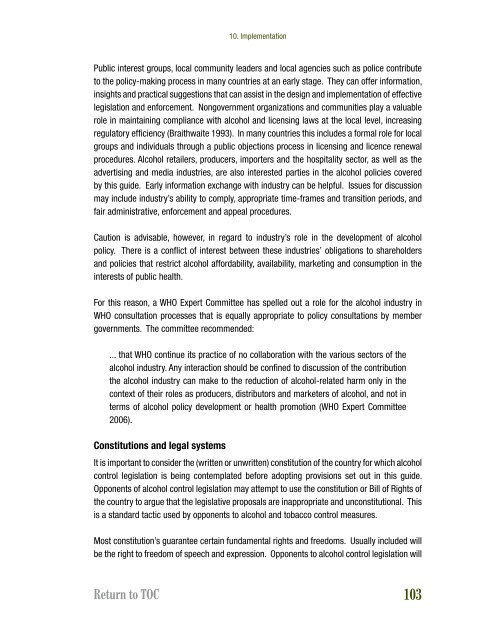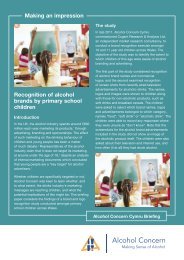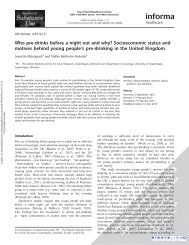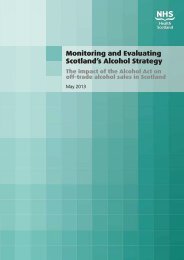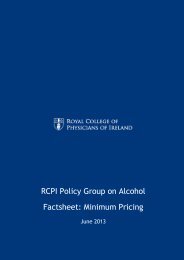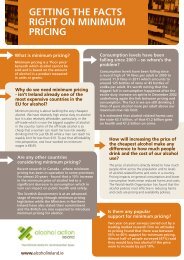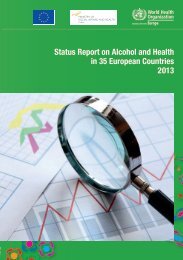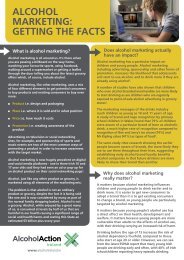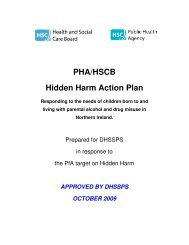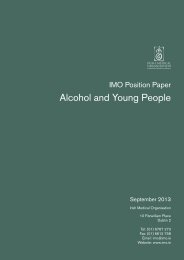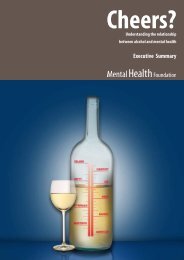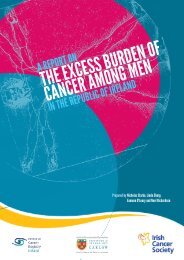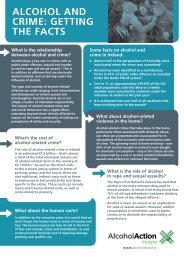Addressing the harmful use of alcohol - WHO Western Pacific Region
Addressing the harmful use of alcohol - WHO Western Pacific Region
Addressing the harmful use of alcohol - WHO Western Pacific Region
You also want an ePaper? Increase the reach of your titles
YUMPU automatically turns print PDFs into web optimized ePapers that Google loves.
10. Implementation<br />
Public interest groups, local community leaders and local agencies such as police contribute<br />
to <strong>the</strong> policy-making process in many countries at an early stage. They can <strong>of</strong>fer information,<br />
insights and practical suggestions that can assist in <strong>the</strong> design and implementation <strong>of</strong> effective<br />
legislation and enforcement. Nongovernment organizations and communities play a valuable<br />
role in maintaining compliance with <strong>alcohol</strong> and licensing laws at <strong>the</strong> local level, increasing<br />
regulatory efficiency (Braithwaite 1993). In many countries this includes a formal role for local<br />
groups and individuals through a public objections process in licensing and licence renewal<br />
procedures. Alcohol retailers, producers, importers and <strong>the</strong> hospitality sector, as well as <strong>the</strong><br />
advertising and media industries, are also interested parties in <strong>the</strong> <strong>alcohol</strong> policies covered<br />
by this guide. Early information exchange with industry can be helpful. Issues for discussion<br />
may include industry’s ability to comply, appropriate time-frames and transition periods, and<br />
fair administrative, enforcement and appeal procedures.<br />
Caution is advisable, however, in regard to industry’s role in <strong>the</strong> development <strong>of</strong> <strong>alcohol</strong><br />
policy. There is a conflict <strong>of</strong> interest between <strong>the</strong>se industries’ obligations to shareholders<br />
and policies that restrict <strong>alcohol</strong> affordability, availability, marketing and consumption in <strong>the</strong><br />
interests <strong>of</strong> public health.<br />
For this reason, a <strong>WHO</strong> Expert Committee has spelled out a role for <strong>the</strong> <strong>alcohol</strong> industry in<br />
<strong>WHO</strong> consultation processes that is equally appropriate to policy consultations by member<br />
governments. The committee recommended:<br />
... that <strong>WHO</strong> continue its practice <strong>of</strong> no collaboration with <strong>the</strong> various sectors <strong>of</strong> <strong>the</strong><br />
<strong>alcohol</strong> industry. Any interaction should be confined to discussion <strong>of</strong> <strong>the</strong> contribution<br />
<strong>the</strong> <strong>alcohol</strong> industry can make to <strong>the</strong> reduction <strong>of</strong> <strong>alcohol</strong>-related harm only in <strong>the</strong><br />
context <strong>of</strong> <strong>the</strong>ir roles as producers, distributors and marketers <strong>of</strong> <strong>alcohol</strong>, and not in<br />
terms <strong>of</strong> <strong>alcohol</strong> policy development or health promotion (<strong>WHO</strong> Expert Committee<br />
2006).<br />
Constitutions and legal systems<br />
It is important to consider <strong>the</strong> (written or unwritten) constitution <strong>of</strong> <strong>the</strong> country for which <strong>alcohol</strong><br />
control legislation is being contemplated before adopting provisions set out in this guide.<br />
Opponents <strong>of</strong> <strong>alcohol</strong> control legislation may attempt to <strong>use</strong> <strong>the</strong> constitution or Bill <strong>of</strong> Rights <strong>of</strong><br />
<strong>the</strong> country to argue that <strong>the</strong> legislative proposals are inappropriate and unconstitutional. This<br />
is a standard tactic <strong>use</strong>d by opponents to <strong>alcohol</strong> and tobacco control measures.<br />
Most constitution’s guarantee certain fundamental rights and freedoms. Usually included will<br />
be <strong>the</strong> right to freedom <strong>of</strong> speech and expression. Opponents to <strong>alcohol</strong> control legislation will<br />
Return to TOC<br />
103


